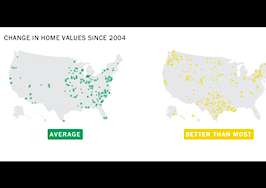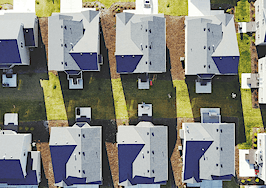NEW YORK — After fleeing Budapest, Hungary, during World War II, Amy Bohutinsky’s grandparents and father — who was nine years old at the time — immigrated to the U.S. in 1949.
Her grandfather spoke no English and took a job as a dishwasher, then a second job to save money, and within a decade her grandparents were able to buy their first home. They saved more money and were eventually able to purchase two duplexes and a triplex to rent out.
“And soon my grandparents were making a healthy living on the back of real estate, my grandfather as a real estate investor and landlord,” Bohutinsky, COO of real estate giant Zillow Group, told attendees at Inman Connect New York this morning. “They sent my dad to college. They were even able to buy a vacation home in the mountains that reminded them of Eastern Europe.”
Her grandparents passed on the idea of the American Dream to her, Bohutinsky said.
“This idea that anyone here can work hard, buy a home, build wealth through that home, and with that wealth creation, create opportunity for generations to come. This is why every single one of us do what we do,” she said.
But the American dream and what her family experienced hasn’t always been available to everyone, Bohutinsky noted, pointing out disparate rates of homeownership among blacks and Hispanics compared to whites.

One reason for this is that mortgages in the post-war homeownership boom were often not available to minorities. From 1934 to 1962, minorities got less than 2 percent of $120 billion in housing financing underwritten by the government, Bohutinsky noted.
Federal Housing Administration (FHA) loans for the Long Island, New York, model suburban development Levittown, for example, were exclusively available to “Members of the Caucasian Race.”

Within a decade, Levittown grew from a potato field to a community with more than 70,000 residents — every single one of them white, Bohutinsky said.
“This played out in thousands of communities at the time across the United States,” she said.
Such policies were outlawed as part of the Fair Housing Act of 1968, but they nonetheless stopped many families from being able to pass equity and wealth on to future generations, creating disparities that continue today.
“Today blacks bring home about 60 percent of the income of white families, but when you look at accumulated wealth, African American families have just 5 percent of accumulated wealth,” she said.

But access to homeownership isn’t just about race, according to Bohutinsky.
She noted that 10 million people lost their homes during the Great Recession and 5 million people are still underwater with no home equity. Between 2006 and 2017, the national homeownership rate fell from 69 percent to 64 percent.
“As people who build our businesses off of others owning homes and encouraging other people to buy homes … how do we as an industry and professionals impact this statistic?” she said. “How do we create a landscape where more people can be homeowners?”
An increasing number of renters across the country are “housing insecure” — just one emergency or lost paycheck away from homelessness, according to Bohutinsky.
While historically renters have paid a quarter of their income in rent (25 percent), that figure is now up to 29 percent nationwide and even higher in major cities like Los Angeles (48 percent), Miami (41 percent), and New York (39 percent).
“When people can barely afford the rent, they’re not saving money. They’re not thinking about being homeowners of the future. They’re trying to keep a roof over their heads,” she said.
A rent increase of just 5 percent in some cities nationwide means hundreds or thousands more people end up homeless, she said.
The key to creating more homeownership is to think about it in “long game” terms, according to Bohutinsky.
“Think about how do we help those who can barely afford their rent [get] to a stable place so they can begin to save money and so that they can become the homeowners of the future,” she said.
Things everyone can do include:
- Volunteering time, i.e. building homes through a charity such as Habitat for Humanity
- Raising money, i.e. organizing a 5K race for needy families
- Using your knowledge to help educate people, i.e., hosting a homebuying seminar
- Supporting victims of natural disasters, as Keller Williams and others did after Hurricane Harvey
In October, Zillow Group launched its first social impact program, “The Home Project, pledging $5 million to help those on the verge of homelessness.
Over the next year Zillow Group will expand the program so that “the entire industry” can participate, Bohutinsky told attendees.
“We know that Americans want to own homes. People believe in the American dream. The problem is so many of them can’t,” she said.
“Yet as an industry … so many millions of dollars and hours of our advocacy are spent on the short term, trying to convince people to want to own a home. These people want to own a home.”
The expanded Home Project program will focus on “homeownership where it counts the most: playing the long game and to help people find stability and find a home in the future,” she added.
“Because our hope if you join us … our hope for the future is that we can create story after story that is just like my family’s story: where people in America can realize the American Dream … I hope you’ll join us.”












